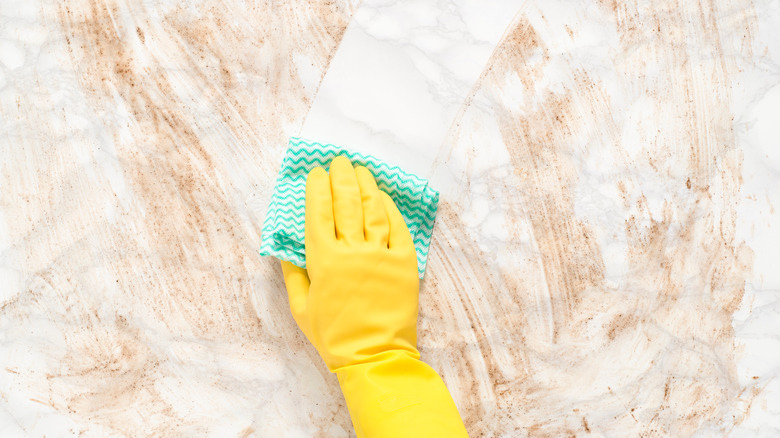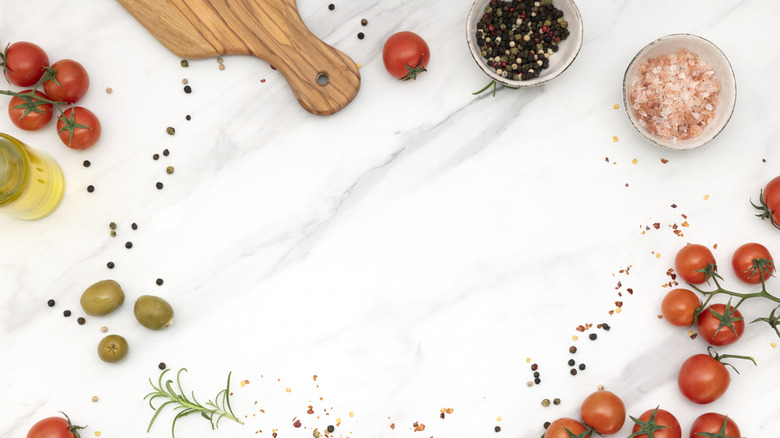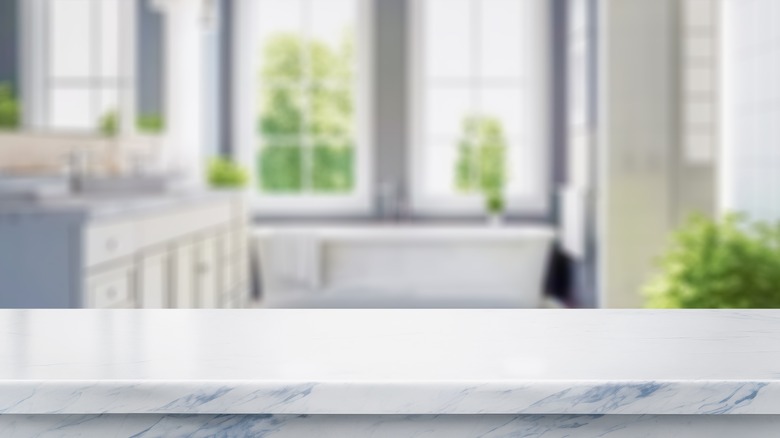The Best Way To Clean Your Marble Countertops After A Hard Day Of Cooking
Marble countertops are a dream. They're perfect for keeping foods chilled and can also serve as the perfect backdrop for your next food 'gram. You can even put hot dishes right down on them. Anyone who has made the transition to solid marble counters knows what an upgrade they are in every way. However, although solid stone surfaces like marble countertops are durable, they are still susceptible to wear — especially in a high-use area like the kitchen.
When it comes time to cleaning them, there are some key guidelines. The Natural Stone Institute recommends blotting, not wiping (so as to not spread anything that may stain) and doing so only with water, mild soap, and a soft cloth.
Even though it may seem like the best way to clean and disinfect your countertops is with good old bleach, this caustic chemical can do a lot of damage to marble surfaces. So can natural solutions like lemon juice and vinegar. Avoid all abrasives and acids when it comes to your marble and stick to water and soap. Just make sure to remove all residue and dry the surface completely to avoid any hard water stains.
If you don't keep up with cleaning and maintenance of your marble countertops, they can diminish in strength and appearance. While they can be fixed by a professional stone restoration service, that can be costly; and an ounce of prevention is worth a day of pricey restoration.
What can damage marble countertops while cooking?
Although marble is certainly more durable than laminate countertops — and a beautiful choice for home décor — the material is fairly delicate as far as solid stone surfaces are concerned. It's quite porous and soft compared to other, stronger stone counter surfaces like quartz. Without proper care, marble is prone to scratching, etching, and staining.
Scratching is exactly what it sounds like: a manual force creating scratch lines in the surface. This can be from an errant knife, but it can also be caused by harsh scrubbing or, even by dust and hair being ground into the surface over time — so even flour, sugar, spices, and salt could cause scratching on counters if not cleaned fully.
Etching is chemical in nature — any contact with acids like wine, vinegar, fruit juice, and the like can chemically erode the marble. The minerals and salt in hard water can cause etching, too. Lastly, staining is of course when colored spills leech into the porous stone. Berry juice, vegetable juice, red wine, coffee, and whatever else spills in a kitchen that has a pigment can stain marble, but so can fats like oil and dairy, which can seep into the porous stone and cause discoloration even if it's essentially colorless. This is why cleaning of your marble countertops after every use is imperative.
Short-term vs. long-term care for marble countertops
The key for day-to-day care of marble countertops is to clean them immediately after use. If there's something that spills on the counter, regardless of what it is, clean as you cook as much as possible with mild dish soap and warm water. If you miss a spot and it begins to set, you can try mixing what's called a poultice, which is a paste left to set and work on more stubborn areas (it's made of 3% hydrogen peroxide and baking soda in a 1:2 ratio).
Be aware that scrubbing baking soda on marble can be a mistake as it can cause scratching, so it's wise to be as gentle as you can. Professionals may be more effective with certain poultice formulas, but some stains cannot be removed fully from a light stone like marble (all the more incentive to clean quickly!).
Certain maintenance efforts should be left to professionals, however. Etching, for example, will need to be reversed by stone restorers trained in handling etched marble. So is the case with resealing. The downside of marble countertops is that they need to be tended to more frequently than other stones, with up to twice a year resealing. It's worth mentioning that sealants are important protection for your marble counters, but they won't make the stone indestructible; both can be damaged by improper care. Sealant can either be a barrier or an "impregnator," which does not encase the stone like epoxy but instead works as a repellent. This is why proper care of your stone surfaces is critical at all times.


